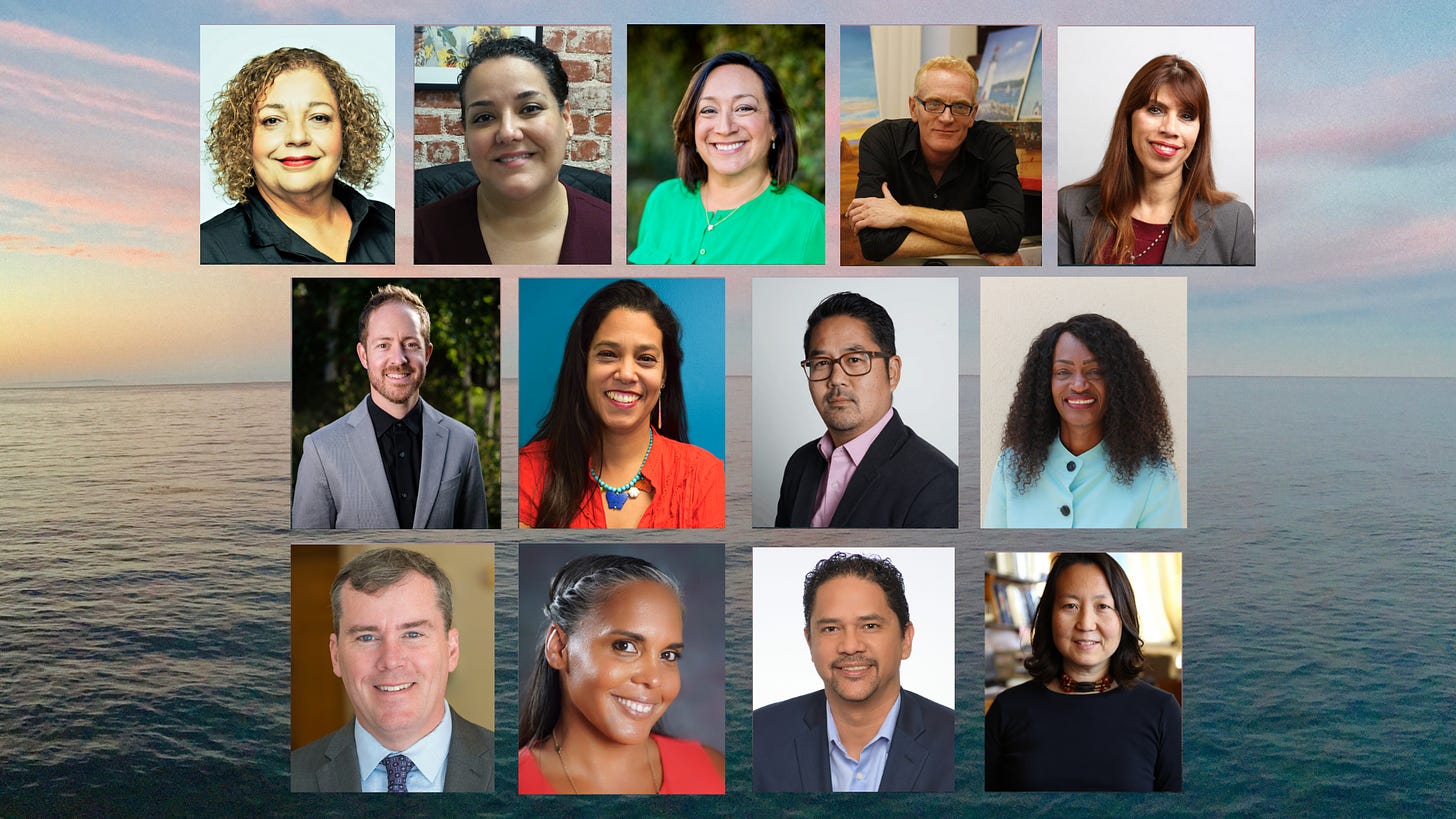I’m guessing I’m not the only one whose every other email is getting bounced back with an “out of office” response, right? It feels like people are finally taking the virtues of vacation seriously this year.
But just a week away (or even less) is not enough restoration for some in the overworked, understaffed nonprofit sector. The Durfee Foundation, recognizing this fact looooong before covid, started funding sabbaticals for nonprofit leaders. The goal? To be “rigorously unproductive.” Yup, seriously. How radical is that?
This year, they’ve more than doubled their sabbatical awards and I wanted to hear all about it. I caught up with Stella Chung of the Durfee Foundation to learn more…
Courtney Martin: The Durfee Foundation has a long history of recognizing the importance of sabbaticals, which I wrote about for The New York Times. You started your sabbatical funding in 1997. What did you all notice about this pandemic year and its pressures on leaders, and what did you decide to do about it?
Stella Chung: If it wasn’t clear to us already, 2020 showed us that nonprofit leaders, community organizers, and people at the front line, providing support and social services to the most vulnerable, are critical to the fabric of our communities. When the pandemic initially began, we actually put our 2020 application cycle on pause. We weren’t sure when folks would be able to travel again and there were still so many unknowns about the virus. We reckoned that our application would be the last thing on people’s minds. Over the ensuing months, a number of colleagues told us about the incredible stress and burnout that leaders were facing due to the multiple intersecting crises of the past year. Those conversations prompted us to remember and recommit to our north star–support and take care of those who are on the front lines of change.
When we decided to reopen the application, we were amazed by the response we got and the overall caliber of the applications submitted. Unlike past application cycles, there was a clear sense of urgency in all of this year’s applications. Ultimately, we decided that in this moment of extraordinary need, when these leaders had done so much to take care of us and our communities, it was our turn to take care of them.
Our board decided to break its own rules and award 13 sabbaticals, more than double what we’d anticipated.
We want this announcement to send a message to other funders that the wellness of our leaders and their staff is a priority and a necessity to see the sustainable and lasting change we so often talk about.
Tell us a bit about the kinds of people who are going on sabbaticals thanks to this approach. What are they facing? What are they hoping to get out of their time off?
This year, we have 13 incredible nonprofit leaders in the 2021-2022 sabbatical cohort from all over Los Angeles County! The cohort includes leaders like Alexandra Suh of the Koreatown Immigrant Workers Alliance (KIWA), whose organization distributed $4.7 million in funds and thousands of tons of food to immigrant workers and their families excluded from federal stimulus funds during the pandemic, and Martha Arévalo of CARECEN, who leads the largest Central American immigrant rights organization in the country and has had to deal with the Trump administration, the most anti-immigrant period in recent history.
They all work in different and intersecting fields but have the common goal of serving and bettering Los Angeles. Like so many in the nonprofit sector, they’re facing extraordinary emotional burdens, stress, and burnout in their jobs. Especially in 2020, the need for their leadership was even greater. They were called to do everything from organizing essential workers to setting up vaccine clinics, all while tending to the health and well-being of family members and staff and often managing children at home because of school closures.
On top of all of this, 2020 was a year of great loss. Many are still grappling with the loss of loved ones as well as their community members, and they haven’t been able to take the proper time to grieve, given the extraordinary demands of their jobs. You can learn more about all the fellows here.
All the leaders are hoping to get to do something that they wouldn’t have the chance to do without the grant, whether that’s backpacking around Europe or hiring a personal trainer. It’s whatever they decide will recharge their batteries. I also think most of the leaders apply to the sabbatical because they have a strong desire to better themselves and their organizations. They get to the application stage because they realize that something about the way they’re working needs to change.
At the end of the day, it’s about having the gift of time and permission to create new pathways of moving forward.
So often funding is focused on “programs goals.” This funding is invested in its opposite--the absence of a deliverable. Is that challenging for everyone to grok? It's so countercultural.
Actually, we do tell our fellows that they have one goal–to be rigorously non-productive. Next, they usually ask us, “What’s the catch?” But there’s no catch!
Over the years, we’ve learned that that one goal is a challenge in itself. Oftentimes, it’s the first time in a long time that these leaders are being given the opportunity to think about what they want and maybe even who they are outside of their organization. We don’t want them to take this sabbatical so that they come back and work harder, but so that they feel permission to let go of tasks and responsibilities that no longer serve their vision and purpose and to delegate those to other capable staff.
When leaders come back, they actually realize that they are not indispensable.
No one single staff member should ever be. They come back and see that all the checks have been signed, grant reports are submitted, and that the building is still standing. This act of letting go has led to a number of positive, unexpected outcomes including increased organizational capacity, increased board efficacy, and overall, a healthier organizational culture.
It feels like we are experiencing this moment of real re-examination around work, productivity and pace. Some people seem compelled to return to pre-covid ways of working, but some people are really trying to push into a new paradigm, to sort of “decolonize pace” so to speak. Is that what you're seeing as it relates to this sabbatical conversation?
When the foundation started the sabbatical program, we thought we’d only fund this for a few years at most. We assumed other funders would follow suit and create their own programs. Twenty-four years later, we are still one of a handful of foundations funding nonprofit sabbaticals in the nation.
While change has been slow, it definitely has not been a lost cause. We’ve been pleasantly surprised to hear more and more from foundation colleagues, especially during the global pandemic, who want to learn about our sabbatical program and are thinking about how to provide support to the people who do the work, not only the programs.
More importantly, we’ve seen a number of our nonprofits, many of which are led by our sabbatical alums, create their own internal sabbatical policies for staff. Our goal is to normalize rest and rejuvenation and show that it’s not a luxury but a necessity for people in this sector. If readers are interested, they can also access our sabbatical how-to guides for both nonprofits and funders.
There is so much talk about transforming philanthropy, but I think a lot of people feel like there’s not a lot of walk. How do you all keep yourselves pursuing the practice of actually doing philanthropy differently at the Durfee Foundation, not just talking about it?
At Durfee, we never assume that we’ve got it all figured out. Our grantees are the experts and we have the immense privilege of supporting them as they work on the front lines of change. We try to convene them regularly and include them in many of our decision making processes including grant selection panels.
In fact, many of our best ideas come from the field like our Stanton Fellowship, a research and development grant for LA changemakers, which came out of the Sabbatical alumni group. They’re always very generous to give us their time and feedback when we ask, so we make sure that they also feel welcome to count on us too. We’re also a partner in the Trust-Based Philanthropy Project, which launched in January 2020. It’s a five-year, peer-to-peer funder initiative to address the power imbalances between foundations and nonprofits and build relationships based on transparency and mutual learning.
It feels like an exciting moment to be in philanthropy as we engage in creative and stimulating dialogue with our peers about power-sharing and equity.
We will be donating to Women Cross DMZ (mobilizing women for peace in Korea) in honor of Stella’s work. Feel free to pile on, as always, if their mission moves you!
Pre-ordered my new book, Learning in Public, yet? Just checking. I know. You’re the best.






Thanks for highlighting this work. I had no idea that such a grant existed. And I’ve lived in LA area for 53 years! Fantastic concept.